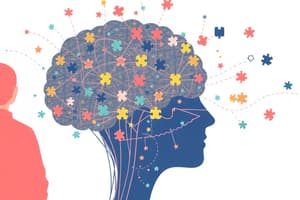Podcast
Questions and Answers
Which of the following statements is true about people with autism spectrum disorder (ASD)?
Which of the following statements is true about people with autism spectrum disorder (ASD)?
- Their obsessive behaviors and islets of ability can be fully explained by an undeveloped theory of mind.
- They universally fail to understand false beliefs, indicating a complete lack of theory of mind.
- Their success on first-order belief tasks suggests they may use a strategy that does not involve understanding mental representations. (correct)
- Their inability to understand other people's minds can be attributed solely to their language problems.
Which of the following aspects of ASD might be explained by an inability to understand other people's minds?
Which of the following aspects of ASD might be explained by an inability to understand other people's minds?
- Difficulty communicating with people and interpreting their speech about mental states. (correct)
- Insistence on sameness and routine due to the consistency and predictability of such habits.
- Language problems such as echolalia (repeating what someone has said).
- All of the above.
Which of the following statements is NOT supported by the information provided in the text?
Which of the following statements is NOT supported by the information provided in the text?
- A proportion of children with ASD succeed on first-order false-belief tasks.
- People with ASD may use a strategy other than understanding mental representations to succeed on first-order false-belief tasks.
- The inability to understand other people's minds might contribute to the insistence on sameness and routine in individuals with ASD.
- An undeveloped theory of mind can fully explain all aspects of ASD, including language problems and obsessive behaviors. (correct)
Based on the information in the text, which of the following statements is true?
Based on the information in the text, which of the following statements is true?
Which of the following statements is correct?
Which of the following statements is correct?
Flashcards are hidden until you start studying




